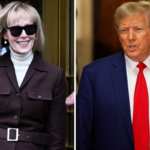In an unprecedented legal development that has rocked the political landscape, a jury recently handed down a stunning verdict, awarding former President Donald Trump a whopping $83 million for defaming renowned columnist E. Jean Carroll. An order has been given to pay compensation. This case, which has been closely followed by legal experts, journalists, and the public alike, is an important one in the ongoing discourse around issues of defamation, power dynamics between public figures and private individuals, and the broader implications for the justice system. Marks the chapter. ,
I. Background:
A. Career and allegations of E. Jean Carroll:
To contextualize the legal battle, it is necessary to delve into the background of E. Jean Carroll’s illustrious career as a columnist and author. Known for her sharp wit and sharp commentary, Carroll gained fame as a longtime contributor to various publications. However, her allegations against Donald Trump brought her into the national spotlight.
Carroll accused Trump of sexual assault in a memoir published in 2019, claiming the incident occurred in the mid-1990s. Trump vehemently denied the allegations, dismissing them as fabrications aimed at tarnishing his reputation. The upcoming legal saga will become a focal point in the evolving story of the #MeToo movement, highlighting the intersection of power, privilege, and accountability.
B. Defamation Lawsuits and Legal Scenario:
The concept of defamation is the core of the legal battle between Carroll and Trump. Defamation, broadly defined as false statements that harm a person’s reputation, has long been a controversial issue in the legal field. The burden of proof in defamation cases often requires the plaintiff to demonstrate the falsity of the statements, the harm caused, and the defendant’s intent or negligence.
This section will explore the intricacies of defamation law, examining relevant precedents, legal standards and the challenges faced by individuals seeking redress for reputational damage.
II. Legal Travel:
A. Filing a Lawsuit:
Carroll’s decision to take legal action against Trump marked a significant moment in the direction of the case. The lawsuit, filed in 2019, alleged that Trump had defamed her by publicly denying the sexual assault allegations and questioning her credibility. The legal team representing Carroll carefully prepared their case, gathering evidence and preparing arguments to withstand anticipated challenges from Trump’s formidable legal defense.
B. Trump’s defense and counterclaims:
Trump’s defense team adopted a multi-pronged strategy, challenging the veracity of Carroll’s allegations and asserting various legal defenses, including the argument that his denials were protected speech under the First Amendment. Additionally, Trump filed a counterclaim against Carroll, escalating the legal dispute and adding layers of complexity to the proceedings.
This section will highlight the legal strategies employed by both sides, highlighting the courtroom drama that unfolded during the trial.
III. Tests:
A. Testimony and cross-examination:
The courtroom became a battlefield as witnesses presented their stand and presented their views on the incidents. Carroll’s testimony, along with expert witnesses and corroborative evidence, was intended to establish the veracity of her allegations. In return, Trump’s legal team engaged in harsh cross-examination, attempting to undermine Carroll’s credibility and cast doubt on the validity of her claims.
B. Public Perception and Media Influence:
The high-profile nature of the trial ensured widespread media coverage, contributing to public perception of the case. This section will explore the role of the media in shaping public opinion, the impact of sensationalist headlines, legal commentary and analyze the broader cultural context surrounding the trial.
IV. Jury’s verdict:
After weeks of intense legal battles, the jury deliberated and returned a landmark verdict, holding Trump liable for defamation and awarding Carroll substantial damages of $83 million. The factors influencing the jury’s decision, the legal reasoning behind the award and the implications for future defamation cases will be examined in depth.
V. Impact and future implications:
A. Precedent-setting decision:
The jury’s verdict in Carroll v. Trump has far-reaching implications for the legal landscape of defamation cases involving public figures. Legal scholars and practitioners will analyze the decision to understand its potential impact on standards of proof, the scope of First Amendment protections, and the balance between free speech and the right to protect one’s reputation.
B. Political consequences and public reaction:
Given the involvement of a former US President, the political implications of the verdict will be substantial. This section will explore the reactions of political figures, commentators and the public, analyzing how the verdict may impact the broader discussion on accountability, ethics and conduct of public officials.
VI. Conclusion:
Ultimately, the $83 million defamation verdict against Donald Trump in the E. Jean Carroll case represents a watershed moment in legal history. This comprehensive exploration of the background, legal journey, proceedings and impact of the case aims to provide an in-depth understanding of the significance of the case within the broader contexts of defamation law, #MeToo and the intersection of politics and justice. As legal scholars and the public grapple with the outcome, Carroll v. Trump stands as testament to the complexities inherent in navigating the intersection between power, accountability, and the pursuit of justice in contemporary society.









Leave a Reply